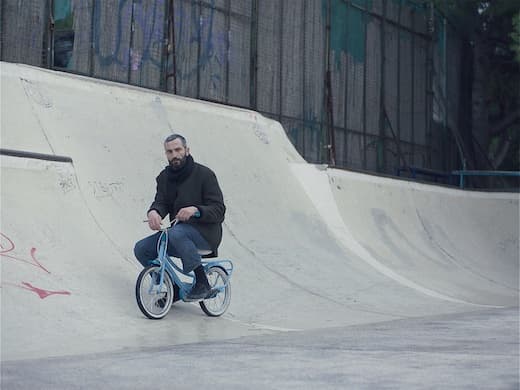
* * *
Christos Nikou, whose film “Apples” is having its New York premiere, earned his chops by working as assistant director on Yorgos Lanthimos’s “Dogtooth.” Those who managed to sit through the latter, nasty piece of work, may bristle at the thought of seeing a film by an acolyte.
Not to worry. Although Mr. Nikou shares a taste for the absurd similar to that of his mentor, “Apples” is nowhere near as disquieting. Transgression isn’t Mr. Nikou’s métier. He’s chummier than that; more humane, as well.
Admittedly, “Apples” isn’t as masterful as “Dogtooth,” but, then, this is Mr. Nikou’s fledgling effort as a filmmaker. He handles himself adroitly, particularly in terms of tone and rhythm. Deadpan is the rule: “Apples” manages to be a comedy without generating much in the way of laughter, and a drama without prompting tears. The picture builds its own inexorable logic and is, in the end, emotionally satisfying — not least because the emotions that have been studiously avoided achieve a gratifying resolution.
Aris (Aris Servetalis) is a 40-something urbanite who, with his gaunt face and plaintive eyes, could’ve stepped out of a canvas by El Greco. The movie opens in his well-appointed apartment and is rendered in flattened, earthy tones. Rhythmic thumping punctuates the soundtrack. What kind of music is this? None at all: It’s Aris hitting his head against a wall. This won’t be the last time Mr. Nikou upends our expectations.
Is it ever made plain that “Apples” takes place in Athens? That the film is in Greek doesn’t necessarily provide a clue about a specific locale, especially given the film’s overriding ambiguity. When, for instance, does the story take place? The technology we see is outdated: cassette tapes, answering machines, and Polaroid instamatic cameras are the predominant means of communication. They are also a primary means of medical care. This is a distinctly off-center cosmos.
How could it not be? There’s a plague afoot: Citizens of all stripes are randomly being struck with amnesia. Early in the film, Aris walks out of his home and comes upon a car seemingly abandoned on a side street. The driver sits on a nearby curb, calmly stating that the car isn’t his. Aris continues his perambulations; he can’t remember where he lives. Our hero has lost all sense of self.
Before you get the idea that “Apples” is a metaphor for Covid, be aware that Mr. Nikou began production before the world went on lockdown. The congruence of the film with recent events may be a fluke, but that’s not to say “Apples” doesn’t gain a bit of currency because of them. Certainly, Mr. Nikou’s dystopian world is milder than our own. The fatality rate from the mystery amnesia is low, and the government response is less proactive than bemused. Which isn’t to say that drastic measures aren’t put into place.
After being picked up without identifying papers, Aris is shuttled off to a medical facility. He’s tagged as patient no. 14842 and put under the care of a doctor (Anna Kalaitzidou) with bizarre ideas about rehabilitation. After conferring with her colleague (Argyris Bakirtzis, a Greek musician whose voice will rattle those new to it), the good doctor sets up a regimen so that Aris can adopt a new identity.
Aris’s therapy consists of proscriptions recorded on cassette tape and delivered by messenger. The first assignment is to ride a bike. Heading to a public park, Aris is snubbed by a group of tweens when he asks for the loan of a bicycle. At the end of the day, a child lends Aris a bicycle that is too small for an adult. In a scene reminiscent of Buster Keaton or Harold Lloyd, a gangly Aris proves himself adept before falling on his behind.
Aris’s medical treatment becomes increasingly convoluted, ridiculous, and risky — his trip to a strip joint is the least of it. He finds a kind of companionship with Anna (Sofia Georgovasili), a fellow patient he meets at a screening of “The Texas Chainsaw Massacre.” All the while, Aris eats a non-stop diet of apples, peeling them with pensive regard — that is, until a green grocer informs him that apples have proven to be good for restoring memory.
We know something’s afoot when Aris makes an emphatic point of switching to oranges and, especially, when he runs into a neighborhood dog. Aris responds intuitively to the animal, thereby showing that the nature of his malady is more complicated than we have been led to believe. To say much more would diminish the evocative potency of a film that, despite some self-conscious longueurs, proves itself surprisingly rich and resonant. Mr. Nikou’s debut is an oddball and a winner.
(c) 2022 Mario Naves
This review was originally published in the June 23, 2022 edition of The New York Sun.